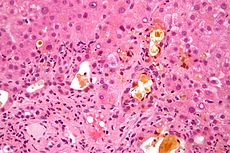
Alkaline phosphatase (ALP) is an enzyme that is important in bone formation, produced mostly in the liver, although also to some extent in the bones, the intestines, and the kidneys. Although ALP is found throughout the body, it is normally in highest concentration in the liver, bile duct, kidneys, bones, and in the placenta during pregnancy.
A blood test for ALP is done to diagnose a number of conditions of the liver and bones, as well as a few other conditions. Elevated levels of ALP may indicate damage to the liver, obstructed bile ducts, various bone disorders including rickets, Paget’s disease, osteomalacia, bone cancer and other tumors in the bones.
The normal range of blood ALP is 20 to 140 IU per liter for an adult who is not pregnant. ALP in the body is generally divided into three different isozomes. ALPI is intestinal ALP. ALPP is placental ALP. ALPL is tissue non-
As suggested above, many different things can cause elevated ALP. In addition to liver damage and bone diseases, high ALP can also result from vitamin D deficiency, certain medications, hyperparathyroidism, and rapid bone growth, sometimes for completely non-
Causes Of Elevated Alkaline Phosphatase –
ALP can be elevated due to damage to liver cells. Elevated ALP can indicate the presence of a wide range of liver diseases. These include fatty liver, cirrhosis of the liver, hepatitis, liver cancer, cholestasis, and others. ALP can also be elevated due to liver damage resulting from drugs, alcohol abuse, and the side effects of medications such as the statin family of drugs that is often prescribed to help lower cholesterol. The most common liver-
Causes Of Elevated Alkaline Phosphatase –
A similarly long list of bone diseases and injuries can also cause elevated ALP. These include bone fractures, bone cancer, non-
Causes Of Elevated Alkaline Phosphatase –
In addition to liver cancer and bone cancer, elevated ALP can result from many other cancers. These include breast cancer, lung cancer, Hodgkin lymphoma, colon cancer, and pancreatic cancer. Most of these cancers produce elevated ALP as a secondary effect due to their effects on either the bones or the liver.
Corroborating Tests
Elevated ALP can be an indication of a number of very serious medical conditions, as well as of other conditions that are not problems at all. To pin down what is causing the elevated enzyme (when it isn’t obvious, e.g. when the patient has broken bones or is pregnant), other diagnostic tests are normally conducted. These can include tests for elevated liver enzymes such as AST and ALT, tests for kidney function, and the use of medical imaging to look for cancer tissues, fractures, or damage to the liver. AST and ALT are the most common liver enzymes for testing and more specifically indicate the presence of liver damage or liver disease, especially when found in conjunction with elevated ALP.
A blood test for ALP may also be used in follow-
or other diseases should if successful result in the elevated ALP dropping to normal levels.